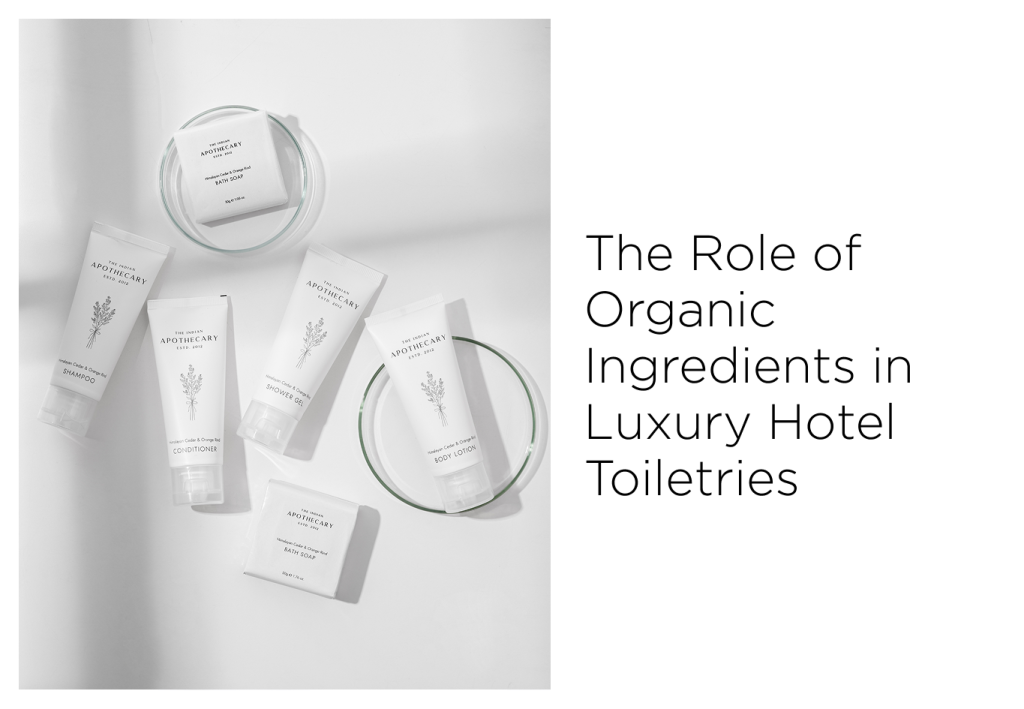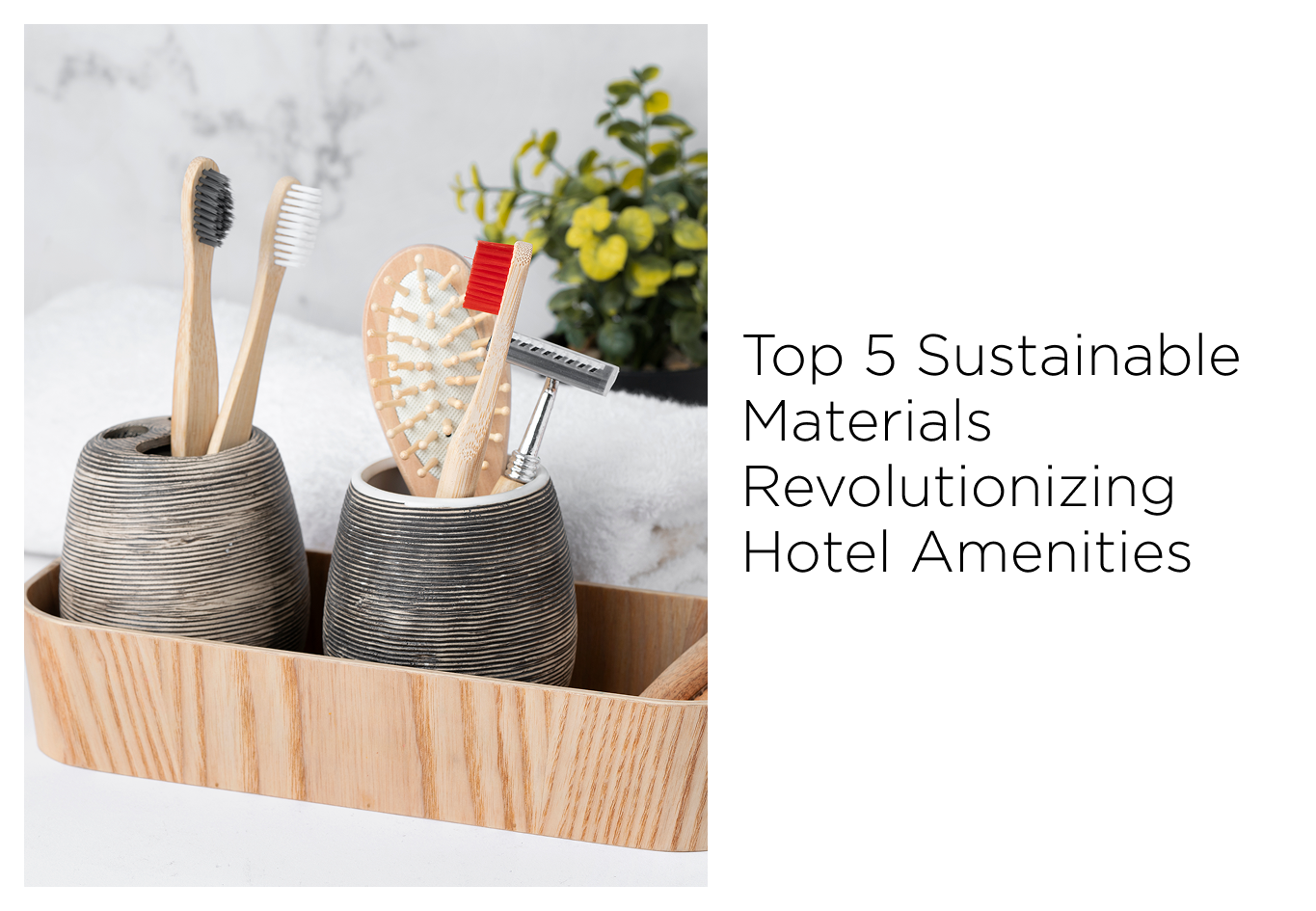Luxury hotel amenities serve as a key component of a hotel’s aesthetic, telling a story far beyond the view and décor; the toiletries alone can convey an image of the property’s classification. Today’s guests strike a delicate balance between sustainability and indulgence, and The Indian Apothecary has emerged as a collection that strikes the balance beautifully.
Why Luxury Hotels Are Rethinking Guest Amenities
From Generic to Bespoke: The Shift in Guest Expectations
A nondescript translucent pump bottle containing white-label shampoo is a relic of the past. Today’s guests wish to form a bond and be provided with authentic, local, and character-rich experiences. Amenities are an extension of the hotel’s narrative, providing an opportunity to leave a lasting imprint.
The Rise of Wellness Tourism and Its Influence on Luxury Hotel Amenities
The impact of the global $639 billion wellness tourism industry is undoubtedly profound on the hospitality sector. Today’s guests expect more than an accommodation – they seek a restorative experience as well. Sustainably sourced hotel toiletries, like those from The Indian Apothecary, are crafted to more than just cleanse; they are designed to heal, nurture, and inspire.
The Indian Apothecary Collection Begins
Drawing Inspiration From Ancient Indian Wisdom
The Indian Apothecary Collection incorporates wellness practices from centuries ago by steeping green tea and rosemary, as well as utilizing essential oils to create calming scents and restore balance.
Geared Toward Today’s Eco-Friendly Traveler
This goes beyond just providing luxury services to offering responsible and compassionate services to the planet. Eco-friendly travelers appreciate the brand’s cruelty-free, vegan, and green tea with essential oils and rosemary.
The Eco-Chic Advantage
Responsible Sourcing and Packaging
The collection exemplifies elegance while endorsing eco-friendly hotel toiletries with plant-derived ingredients and recyclable, eco-centered packaging.
Vegan, Paraben-Free, and Cruelty-Free
The collection exemplifies elegance while endorsing eco-friendly hotel toiletries with plant-derived ingredients and recyclable, eco-centered packaging.
Green Tea, Nature’s Antioxidant Powerhouse
The green tea blend not only protects the skin with its rich antioxidant properties but also offers a refreshing and calming aroma.
Rosemary, Uplifting Aromatherapy for Mind and Skin
Rosemary, with its invigorating scent, awakens the senses to antimicrobial benefits, providing a blend of function and fragrance.
The Impact of Essential Oils on Guest Experience
With the right blends, essential oils can transform an ordinary shower into a ritual akin to those in luxurious spas.
Advancing the Guest Experience Outside the Washroom
Branding with Fragrances: The Guest’s Perspective
As we have noted, fragrance is a powerful cue for recollection. Guests instantly remember your property the moment they inhale rosemary or green tea.
Delicate Ways to Differentiate that Instill Loyalty and Promote Repeat Stays
When combined with small, consistent acts of brand remembrance, steadfast first-time visitors are converted to brand ambassadors.
The Apothecary Strategy to Enhance Hotel Brand Equity
Boutique Properties Capitalizing on Aroma-Based Remembering
These smaller places are more intimate and have a more personalized approach. The signature fragrances from Indian Apothecary greatly assist in creating those moments for guests long after their stays.
Big Interests Using Eco-Friendly Credentials as a Unique Selling Proposition
These larger hotel groups must now also meet the expectations of guests in terms of sustainability; therefore, eco-conscious products aid in portraying corporate responsibility.
Hoteliers’ Actionable Advice
Complementary Accessories: White Gold Box & Brown Paper Pouch Series
Branding and luxury go hand in hand. The use of elegant packaging for toiletries enhances the perception of the brand and greatly improves the guests’ experience.
Optimal Design for Guest Interaction: Placement Proposed for Maximum Interaction with Guests
The emplacement approach, to be used in the guest room, spa, or welcome kit, ensures that guests can interact with the product.
Upselling Opportunities Through Retail Offerings
Allow the guests to purchase the collection so that the customers can take the experience home.
Behind the Scenes – Quality Control & Consistency
Rigorously Crafted Protocols for Ingredient Sourcing
The steps from plant to product are meticulously scrutinized to guarantee the extraction’s integrity and potency.
Testing for Uniformity in Fragrance and Texture in Every Product Batch
In every location, every batch is tested to ensure guests receive the same consistent experience.
Why The Indian Apothecary Aligns with ESG Goals
Achieving Certification for Sustainability and Compliance with Green Tourism
Eco-conscious toiletries are instrumental in attaining environmental certifications such as Green Key or EarthCheck.
Telling the Hotel’s Sustainability Narrative
When guests learn about the eco-friendly decisions made, they become part of your brand’s sustainability narrative.
My First Encounter with The Indian Apothecary: What Stood Out
A boutique hotel in Goa is etched in my memory because its bathrooms had a warm rosemary scent. The first shower made every day’s stress seem to melt away. When unpacking, I remember the fragrance lingering on my hands. It’s humorous how a scent can serve as an unanticipated postcard.
Enhancing Competitive Advantage in the Hospitality Industry
Differentiation Through the Lens of Guest-Centric Services
In a market flooded with claims of luxury hotel amenities, sustainable premium toiletries within hotel bathrooms make a distinct impact.
Transforming Luxury Hotel Amenities Into Strategic Marketing Tools
When guests truly enjoy the experience, they will capture, share, and discuss it, offering the luxury hotel invaluable marketing exposure.
Conclusion – Beyond Just Toiletries
The Indian Apothecary is a gentle care of heritage and sustainable luxury hotel amenities that embodies more than its purpose. For hoteliers, the choice of such amenities translates to enhanced guest experience, strengthened brand allegiance, and sustainable stewardship.
FAQs
1. What distinguishes The Indian Apothecary from standard hotel toiletries?
It incorporates elements of luxury, sustainability, and Indian wellness traditions into an unforgettable, multi-sensory experience.
2. Are the ingredients safe for sensitive skin?
Yes, the products use gentle, plant-derived ingredients that are safe for a majority of skin types.
3. Can boutique hotels afford such premium amenities?
Absolutely. The collection offers flexible, scalable options, ensuring quality is maintained across different property sizes.
4. How does The Indian Apothecary meet sustainability objectives?
Through sustainable materials, recyclable packaging, and cruelty-free, vegan products.
5. Is the retail version available for purchase by the guests?
Yes, a number of hotels provide retail-sized versions for guests to take the experience home.

